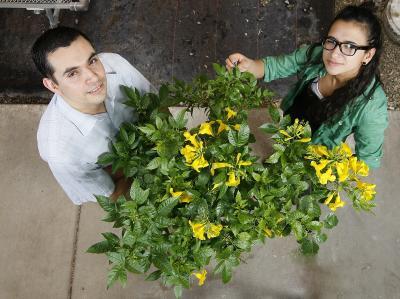WEST LAFAYETTE, Ind. - Purdue University researchers have developed a set of propagation and production protocols that will help Indiana greenhouse growers bring a tropical plant into flower for spring sales.
Roberto G. Lopez, an assistant professor of horticulture, and Arianna P. Torres, a doctoral student in agricultural economics and a former graduate student under Lopez, determined the optimal light intensity, temperature and photoperiod for Tecoma stans, a flowering shrub with yellow, trumpetlike flowers. Their findings, based on seeds and seedlings grown under varying light and temperature conditions, were published in two papers in the journal HortScience.
"We wanted to introduce a new flowering patio or bedding plant to Indiana, and we believe that because of its exotic physical attributes, there is a market here," Torres said.
Not surprising since it is native to Central and South America, Tecoma stans needs a lot of light and warmth. But the plant's need for 14 or more hours of light per day to flower, also called photoperiod, did surprise the researchers.

Roberto Lopez and Ariana Torres developed production protocols for Tecoma stans, a tropical flowering shrub.
(Photo Credit: Purdue Agricultural Communication photo/Tom Campbell)
"Since it grows near the equator, we didn't expect it to need long days to flower," Lopez said. "It's an energy-intensive crop because it needs supplemental light and warm temperatures, but it can be a profitable crop for growers."
Lopez and Torres also noted that Tecoma stans was not a target of most pests found in Indiana. It also is drought-tolerant.
Tecoma stans is a perennial in its native environment but will not survive Indiana winters. However, it potentially can be overwintered indoors. Lopez said it's likely an annual in Indiana that could be potted or planted in a flowerbed for one season.
Lopez and Torres will develop a Purdue Extension bulletin that will give greenhouse growers detailed specifications needed to grow and induce Tecoma stans into flower.
Source: Purdue University